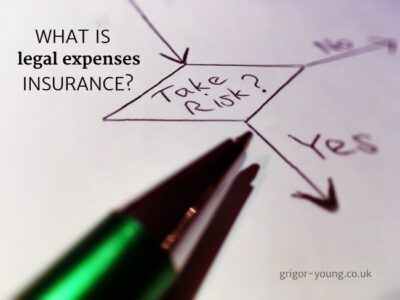This might seem like a very simple question.
Too simple, even.
But insurance is often confusing. We find that people don’t always readily understand what different types of insurance are intended to do.
Apart from that, many people have Legal Expenses Insurance (LEI) and don’t know it.
And, apart from that, we’re not always very good at explaining it.
In this article, though, we’re going to try and explain some aspects of LEI relative to personal injury claims.
We’ll cover what it is and what it is not. We will look at the different types of LEI which exist. Relative cost of insurance types will figure in our overview and we’ll also consider the timing of taking out the insurance. Finally, we will touch on the question of how easy it is to enforce your own choice of legal adviser under a LEI policy (rather than the LEI insurer’s choice).
LEI is something you purchase to cover the costs of legal advice.
In the context of personal injury compensation claims, this would include:
- advice on your prospects of claiming successfully (liability);
- formulating and intimating the claim to the party the claim is against;
- negotiating with them or their insurers;
- gathering in evidence on liability and regarding the value of your claim (quantum).
Beyond that, you might need to raise a court action, if the claim cannot be voluntarily negotiated to a successful conclusion.
LEI will cover the costs of raising (or defending) a court action.
When can you buy LEI?
You can buy it “before the event” (BTE) or “after the event” (ATE).
The “event”, for a personal injury claim, is the accident that injures you.
For a before-the-event policy, you take it out, say, annually – maybe as an add-on to your house contents insurance – in case you need future advice on a possible claim and maybe even need to raise a court action. The insurance covers your own legal costs and the legal costs of your opponent (which will probably be awarded against you if you lose the case after it goes to court).
I tend to think of LEI as synonymous with before-the-event insurance, but after-the-event insurance is also a form of LEI.
For after-the-event insurance, this is how it works:
- You didn’t have any relevant before-the-event insurance.
- You’ve now had an accident.
- You need to make a compensation claim
You need to insure against the risk of losing the claim and having to pay the other side’s costs.
Which is better – BTE or ATE?
In cost terms, BTE is probably better. The premium you pay will be small and perhaps even nil: it could be a complimentary add-on to the main policy you are buying.
For ATE, the insurer will require a premium to be paid. However, often this premium is only payable if the claim succeeds. The level of premium will depend on the type of case. For example, premiums are usually lower for road traffic accident claims than for accidents at work.
What is LEI not?
LEI is not there to pay the policyholder the actual compensation that they are seeking through the claim. Some policies have a “reverse indemnity” feature which does provide that remedy in fact but that type of clause is rare these days, in our experience.
Accordingly, it’s always necessary to keep an eye on the likelihood not just that the claim will succeed but also that there will be someone with the means and responsibility to pay up any compensation that is awarded.
Also, LEI does not generally cover someone’s liability to pay compensation to others. This would usually be the responsibility of other types of insurance, such as third party insurance (compulsory for road traffic accidents), employers’ liability insurance (compulsory for employers to have) or public liability insurance (which is not usually compulsory though “a good idea” to have in many situations).
Can you choose your own solicitor under LEI?
In the after-the-event situation, you have complete freedom of choice.
The insurance is not already in place and your solicitor will have to take out the policy for you.
Under before-the-event insurance, the issue of freedom of choice of solicitor has been controversial for many years.
BTE insurers have their own panel solicitors and the insurers argue that, to keep costs down and maintain consistency in standards of legal advice, it’s reasonable for them to be allowed to force policyholders to use the insurer’s choice of solicitor rather than the policyholder’s choice.
This approach has been upheld as acceptable practice for the preliminary (“negotiation”) stages of a claim. However, it seems to be recognised that policyholders have freedom of choice once it is clear that a claim will have to go to court.
Whilst this sounds like a bit of a pain – if you want to use your local, specialist solicitor rather than the insurer’s probably-non-local solicitor – in practice, it won’t matter.
You only need the insurance to be definitely in place once there’s a financial risk to you. The risk only begins when a court action is raised.
So, all your local solicitor needs to establish is that (BTE) LEI is in place and that it will cover you if you need to raise a court action.
How we can help
We hope you’ve found something of use in this article covering the question: what is legal expenses insurance?
If you have any questions, please get in touch. All enquiries are at no charge and without obligation. We try to answer as many questions on this website as we can and also (in relation to personal injury) on our Moray Claims website.
You can call us on 01343 544077 or send us a Free Online Enquiry.
Links you might like
These links are to articles on the Moray Claims website. Moray Claims is a trading name of Grigor & Young LLP for personal injury compensation claims services.


